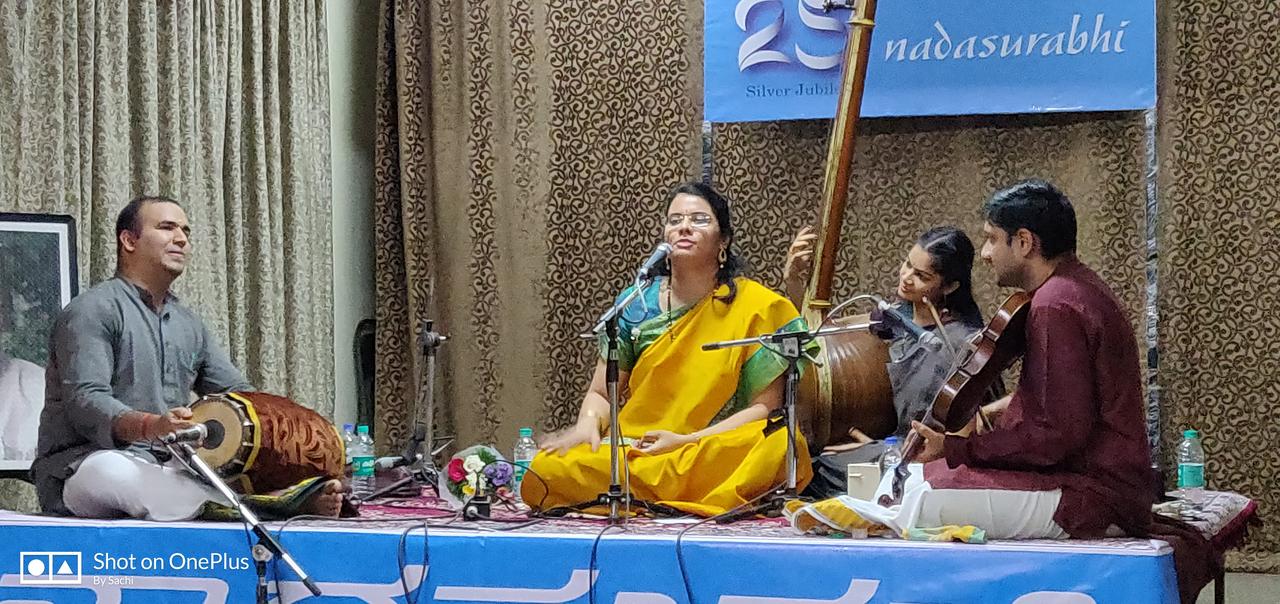Harini also surprised me with a very fine introduction in Kannada. It was from someone who has learnt Kannada and has developed an appreciation for its literary nuances.
The Karnataka Vaibhava this time featured Amrutha in an RTP concert. She was accompanied by B. K. Raghu on the violin and B. S. Prashanth on the mridangam, and her disciple wielding a double - the Tambura and an eternal beatific smile.
Amrutha quickly settled down, cleared her throat, and lo and behold, we were ushered into the world of Kharaharapriya.

For me Kharaharapriya is one of the Big Six. It is called Kafi in HM and holds a prominent place. In CM it is a raga with instant musical appeal of a very Sattvic nature.
That is the reason perhaps that Thyagaraja and Papanasam Sivan have composed such wonderful songs.
The raga seems to me easy to handle. Yet it can become simplistic and even pedestrian. But not in the handling of it by Amrutha. She built indeed a magnificent edifice. I was reminded of the Brihadishvara temple.
Amrutha's voice had a richness and freshness that day. Imagine a wonderful cup of filter Kaapi after a Saturday afternoon siesta. Then you get the idea.
She wove into the rendition nuanced phrases that reminded me of Madurai Mani, Balamurali, MSG, Emani, Karaikuruchi, Ramani... Indeed a stellar multidimensional rendition. It was solid, and more importantly, original.
B. K. Raghu is a good accompanist. He was able to match her phrase for phrase.
There was a sense of humour too. She had sung a phrase similar to a line from Chakkaniraja - Kantiki Sundara. Raghu wove in Janakipathe.
Half way into the Tanam, Todi made an appearance seamlessly from KHP. Like a good bowling change, Todi fell into line and length right away. Then came Shahana. A surprise, and even more bhava-laden than KHP. Then the mandatory Purvi Kalyani. The tanam was rounded off in KHP with a beautiful flourish spanning 2 octaves.
The pallavi line was thematic, contemporary and in Kannada to suit the occasion:
Namma dēśavannu swacchavāgi iḍabēku/ nāḷeya pīḷigege/
Meaning:
We should keep our nation clean, for the next generation!
It was in Khanda Triputa Panchamukhi Tala. The words fitted the Tala cycle without any hassles.
She rendered the pallavi with anuloma, pratiloma, speedy swaras, and a nice muktaya. She changed the raga during swaras to Desh, Shubha Pantuvarali (a surprise change; it sounded somewhat like bemoaning the delay in cleansing the Ganga
Prashanth played with a sense of proportion, competence and good nadam. His Tani was enjoyable.
After the applause had died down, Harini nicely wrapped up again in Kannada. She then asked Amrutha to sing some more.
Amrutha sang an Ugabhoga and the song Nageyu Barutide (humour!) in Maand. Then Uḷḷavaru Śivālayava in Madhuvanti. Both were rendered with panache.
The Mangalam was the Bhadrachala Ramadasu song: Ramacandrāya Janakarājajā
A well-spent Saturday evening. All while India were consolidating their score in England.
Sri. KV Chellappa was there too, it was my pleasure to sit next to him. He will surely have many things to say now!